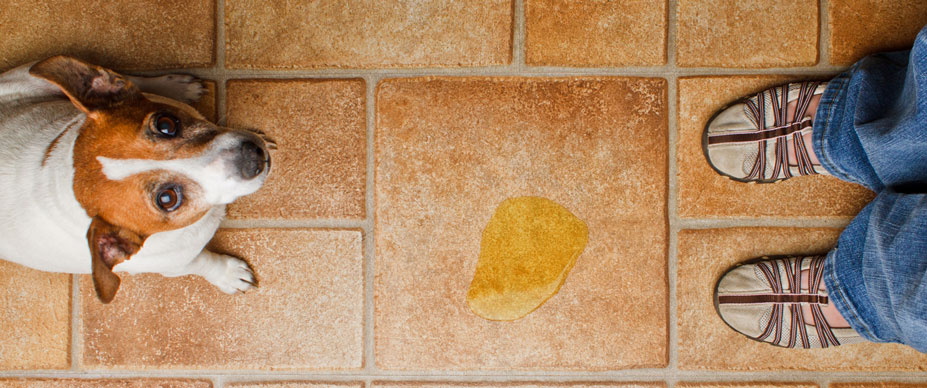Puppy Peeing in the House: Reasons and Solutions
Potty training a pet can be a long process. Unexpected accidents in the house, frequent nighttime breaks, and a slow learning process can sometimes make you feel frustrated and helpless. If you’re feeling at all overwhelmed whenever your puppy pees in an unwanted location, you’re not alone.
When you’re planning for a new puppy, you’ll want to account for potty training time. For some pet parents, choosing an indoor dog potty —such as a training pad—will provide your pup a designated potty spot in your home. For others, the main objective may be to train your pup to pee outdoors only. Regardless of your approach, it’s normal for puppies to have accidents during this process. Accidents can occur for several reasons, most of which are correctable once the root cause is identified.
To resolve the issue and help your dog learn appropriate spots to go potty you’ll first need to determine why your puppy’s accidents happen.
1. Your Puppy Isn’t Fully Potty Trained
If your puppy keeps peeing in undesired spots throughout your home, it may be the result of incomplete potty training. Potty training a puppy takes time and energy. Even if you believe that you have fully potty trained your puppy, they can quickly prove you wrong.
Potty training typically solves two issues: your puppy needs to understand where and when to relieve itself. Until your puppy understands both of those concepts, potty training can feel like a fruitless process, though it’s one of the most valuable lessons you can teach any young dog.
Solution
Persistence and patience are key if you want to make potty training stick long-term. Avoid becoming visibly frustrated and angry with your puppy. Instead, be sure to reward correct behavior and keep track of your puppy’s progress.
With time, potty training your puppy will begin to yield dividends you can see and measure. Accidents will occur less frequently, and your puppy will require less frequent potty breaks to maintain their normal schedule.
2. Your Puppy Is Holding It Too Long
Puppies can also experience accidents in the house because it has been too long since their last break. Given their young age, puppies do not have large bladders. Like much of their body, a puppy’s bladder isn’t yet fully developed.
Many puppies can only hold their urine for short periods. Frequent accidents could be the result of an overly full bladder, especially if your puppy doesn't yet recognize the importance of going potty in a designated spot or area.
Solution
If you believe that your puppy might be holding in their pee for too long, consider increasing the frequency of their bathroom breaks. You don’t need to take your dog outside every 15 minutes; instead, add two or three additional bathroom breaks to your daily routine and monitor your dog’s behavior.
If you notice that your dog fully empties their bladder during extra bathroom breaks, they were likely holding their urine for too long. However, if your puppy neglects to go at all or if they’re emptying a nearly empty bladder—scheduling likely isn’t your problem.
3. You’re Ignoring the Signs
As a dog parent, you have a lot on your plate. Between implementing an exercise schedule, establishing a nutritional diet, and completing your other tasks, you might find your attention diverted at some points during the day. If your puppy keeps peeing in the house when you least expect it, you could be missing some of the signs that your puppy needs a break.
A puppy that’s trained to go outside will do their best to communicate the need for a potty break. They might scratch or sit by the door, whine and pace, or simply begin to tremble.
Solution
Fortunately, the solution to this issue is a simple one: you need to pay close attention to the signs your puppy is giving you. Every puppy communicates differently, and it’s up to you to interpret their messaging. Whether your young dog is pacing, whining, shaking, or walking in circles, recognize their behaviors and take them outside.
If they immediately relieve themselves, you’ve found the source of their indoor accidents.
4. Your Puppy Has Too Much Freedom
It’s also possible that your puppy is allowed too much indoor freedom. Consider limiting your puppy’s freedom in the weeks after you first bring them home. This will allow them to adapt to their new environment without feeling overwhelmed by its size.
Solution
If you believe that excessive freedom is the root cause of your puppy’s indoor accidents, you’ll want to limit their access to certain areas of your home. Consider using a doggy gate to keep them confined to a safe area. Crate training your puppy will also help you limit your dog’s freedom, as your dog learns to recognize their crate as a secure, comfortable space.
5. Your Puppy Isn’t Emptying Their Bladder
In other cases, your puppy might not be completely emptying their bladder when they go outside. Puppies are easily excitable and will want to pay attention to every stimulus when they leave the home. In addition, puppies don’t always have full control over their bladders at a young age.
Solution
Your puppy will develop improved control over their bladder as they age. Unfortunately, there’s not a lot you can do to accelerate this process. Until your puppy learns to fully empty their bladder during each trip outside, you can use absorbent solutions to limit the mess.
Dog diapers can help you maintain a clean home between outdoor trips and until your dog learns to control their urges. Pee pads provide dogs a comfortable indoor potty spot and help keep your floors dry.
Some dog parents will also take their dogs outside more frequently to compensate for incomplete bladder emptying. Even a five-minute safe walk with your dog can sometimes encourage them to re-empty their bladder before returning home.
6. Your Puppy Has A Medical Condition
Some puppies also develop medical conditions, which can result in indoor accidents. Even if you have fully potty trained your puppy, a medical issue can cause involuntary peeing in inappropriate spots throughout the house.
Medical conditions that result in involuntary urination can include:
- Urinary tract infections (UTIs), which cats can get, too
- Ectopic ureters
- Uroliths
- Cushing’s Disease
- Kidney disease
- Spinal cord diseases
Your puppy’s mental health might also play a role in their indoor accidents. If you know your dog is experiencing separation anxiety, indoor peeing could be a secondhand result of their stress. Dogs in heat may also experience bladder issues, though this likely won’t explain your puppy’s problems.
As dogs age or develop medical issues, they can experience canine incontinence. While this issue is perhaps more common in aging dogs than in young ones, it could also explain why your puppy keeps having potty accidents in the house.
Solution
If you suspect that your puppy is facing a medical condition, consult a veterinarian for help. Trained medical professionals can help to diagnose your puppy’s issues, and will work with you to determine the best path forward.
Once your puppy’s medical condition has been addressed, you can resume potty training. Even if your puppy’s indoor accidents don’t immediately subside, potty training can help reinforce any treatment, medicine, or therapy advised by your veterinarian.








